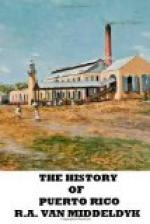[Footnote 12: The manioc of which the “casaba” bread is made.]
[Footnote 13: A “cascabel” (a measure the size of one of the round bells used in Spain to hang round the neck of the leader in a troop of mules) full of gold and twenty-five pounds (an arroba) of cotton every three months for every Indian above sixteen years of age.]
[Footnote 14: Puerto Rico y su historia, p. 173.]
[Footnote 15: Among the Indians given to Soto Mayor was the sister of the cacique Guaybana second. She became his concubine, and in return for the preference shown her she gave the young nobleman timely warning of the impending rebellion.]
CHAPTER V
THE REBELLION
1511
The sullen but passive resistance of the Indians was little noticed by the Spaniards, who despised them too much to show any apprehension; but the number of fugitives to the mountains and across the sea increased day by day, and it soon became known that nocturnal “areytos” were held, in which the means of shaking off the odious yoke were discussed. Soto Mayor was warned by his paramour, and it is probable that some of the other settlers received advice through the same channels; still, they neglected even the ordinary precautions.
At last, a soldier named Juan Gonzalez, who had learned the native language in la Espanola, took upon himself to discover what truth there was in these persistent reports, and, naked and painted so as to appear like one of the Indians, he assisted at one of the nocturnal meetings, where he learned that a serious insurrection was indeed brewing; he informed Soto Mayor of what he had heard and seen, and the latter now became convinced of the seriousness of the danger.
Before Gonzalez learned what was going on, Guaybana had summoned the neighboring caciques to a midnight “areyto” and laid his plan before them, which consisted in each of them, on a preconcerted day, falling upon the Spaniards living in or near their respective villages; the attack, on the same day, on Soto Mayor’s settlement, he reserved for himself and Guarionez, the cacique of Utuao.
But some of the caciques doubted the feasibility of the plan. Had not the fugitives from Quisqueia[16] told of the terrible effects of the shining blades they wore by their sides when wielded in battle by the brawny arms of the dreaded strangers? Did not their own arrows glance harmlessly from the glittering scales with which they covered their bodies? Was Guaybana quite sure that the white-faced invader could be killed at all? The majority thought that before undertaking their extermination they ought to be sure that they had to do with a mortal enemy.




